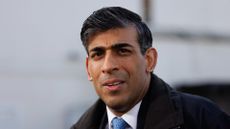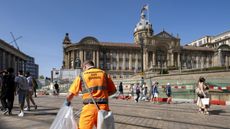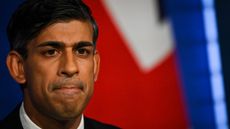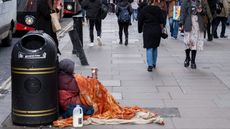Jobless rate down - but will mortgages have to rise?
Better than expected unemployment figures will put pressure on Bank Governor to raise interest rates

A SIGNIFICANT fall in the unemployment figures by 167,000 - the biggest drop since 1997, and better than pundits had expected - gave David Cameron the edge at Prime Minister’s Questions today. But it raised the worrying spectre for Downing Street that it could lead to a rise in mortgage rates before the next general election.
That's because the overall unemployment rate has fallen to 7.1 per cent - just a shade above the seven per cent threshold for raising the bank rate set last year by Mark Carney, Governor of the Bank of England.
A rise in interest rates in the coming months would hit home-buyers who have boosted the housing market by taking out new mortgages, and seriously damage the "feelgood factor" that Cameron and Chancellor George Osborne are hoping to build in the run-up to the 2015 election.
Subscribe to The Week
Escape your echo chamber. Get the facts behind the news, plus analysis from multiple perspectives.

Sign up for The Week's Free Newsletters
From our morning news briefing to a weekly Good News Newsletter, get the best of The Week delivered directly to your inbox.
From our morning news briefing to a weekly Good News Newsletter, get the best of The Week delivered directly to your inbox.
It would also spoil the current Tory mantra that, while available income may be low, working families are benefitting from low mortgage rates.
Minutes before Cameron welcomed the new jobless figures in the Commons, Jeremy Warner, business editor of the Daily Telegraph, said a small rise in interest rates was "now absolutely necessary to take the heat out of what is another housing bubble to give people a pause for thought about how much they are borrowing".
Warner added: "We have only just come off the top of very high levels of borrowing and now here we are go again."He was speaking on the BBC's Daily Politics show from Davos where Osborne is attending the World Economic Summit. The Chancellor may be crowing about the recovery of the British economy - the jobless fall comes within 24 hours of the IMF upgrading its UK growth forecast - but a rise in interest rates would give the Treasury and Number Ten nightmares of a return to families being unable to pay their mortgage debts and/or falling into negative equity.
Warner isn't alone in saying Carney needs to act but will doubtless be pressured by the Treasury not to do so: other economists were saying the same thing on the lunchtime news programmes.
Peter Warburton, director of independent financial analysts Economic Perspectives, said on Radio 4's World At One that the Bank of England was "in a difficult position" because it clearly had not expected the economy to move ahead so quickly. "I would argue the best way to safeguard recovery is to begin to rise interest rates straight away," he said.
Before the inevitable clash between Osborne and Carney comes, there was a predictable face-to-face between Cameron and Miliband in the Commons over the jobless figures, with the Labour leader arguing they masked the true story of falling wealth.
He accused the PM of being "completely complacent" and out of touch with ordinary people who, he said, were £1,600-a-year worse off because of prices rising faster than wages. He accused Cameron of "doing his Bullingdon Club routine".
Cameron hit back at Miliband and his shadow chancellor Ed Balls for getting their predictions of doom wrong.Pointing at Balls, Cameron said: "He predicted 1 million more unemployed and the deficit would go up. The deficit is coming down. Our plan is working. There are 1.3 million more in work. We are securing Britain’s future. It would be put at risk by Labour."
Privately, some Labour MPs are accusing the government of "fiddling" the employment figures by including part-time workers and staff on zero-hours contracts in the totals.
Meanwhile, Nick Clegg, the Lib Dem leader, watched silently from his perch next to the PM, hoping that the row over the economy will take the heat out of his own party’s split over the Lord Rennard sex harassment allegations. On this issue, Nick Robinson, the BBC’s political editor, said on the Daily Politics that he sensed there was now a Lib Dem mood in favour of conciliation. He said: "They have peered over the edge and are saying we don’t really want to go there."
Create an account with the same email registered to your subscription to unlock access.
Sign up for Today's Best Articles in your inbox
A free daily email with the biggest news stories of the day – and the best features from TheWeek.com
-
 What is cloud seeding and did it cause Dubai's severe rainfall?
What is cloud seeding and did it cause Dubai's severe rainfall?The Explainer The future is flooded
By Devika Rao, The Week US Published
-
 American Airlines pilots are warning of a 'significant spike' in safety issues
American Airlines pilots are warning of a 'significant spike' in safety issuesIn the Spotlight The pilot's union listed 'problematic trends' they say are affecting the airline's fleet
By Justin Klawans, The Week US Published
-
 6 star-spangled presidential libraries to visit
6 star-spangled presidential libraries to visitThe Week Recommends These institutions provide insight into American leaders
By Catherine Garcia, The Week US Published
-
 Will Aukus pact survive a second Trump presidency?
Will Aukus pact survive a second Trump presidency?Today's Big Question US, UK and Australia seek to expand 'game-changer' defence partnership ahead of Republican's possible return to White House
By Sorcha Bradley, The Week UK Published
-
 It's the economy, Sunak: has 'Rishession' halted Tory fightback?
It's the economy, Sunak: has 'Rishession' halted Tory fightback?Today's Big Question PM's pledge to deliver economic growth is 'in tatters' as stagnation and falling living standards threaten Tory election wipeout
By Harriet Marsden, The Week UK Published
-
 Why your local council may be going bust
Why your local council may be going bustThe Explainer Across England, local councils are suffering from grave financial problems
By The Week UK Published
-
 Rishi Sunak and the right-wing press: heading for divorce?
Rishi Sunak and the right-wing press: heading for divorce?Talking Point The Telegraph launches 'assault' on PM just as many Tory MPs are contemplating losing their seats
By Keumars Afifi-Sabet, The Week UK Published
-
 How would a second Trump presidency affect Britain?
How would a second Trump presidency affect Britain?Today's Big Question Re-election of Republican frontrunner could threaten UK security, warns former head of secret service
By Harriet Marsden, The Week UK Published
-
 'Rwanda plan is less a deterrent and more a bluff'
'Rwanda plan is less a deterrent and more a bluff'Instant Opinion Opinion, comment and editorials of the day
By The Week UK Published
-
 How the biggest election year in history might play out
How the biggest election year in history might play outThe Explainer Votes in world's biggest democracies, as well as its most 'despotic' and 'stressed' countries, face threats of violence and suppression
By Harriet Marsden, The Week UK Published
-
 'Good democracies include their poorest citizens. The UK excludes them'
'Good democracies include their poorest citizens. The UK excludes them'Instant Opinion Opinion, comment and editorials of the day
By The Week UK Published